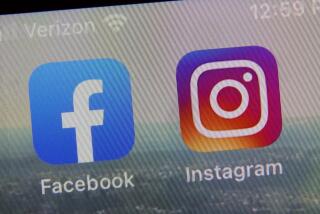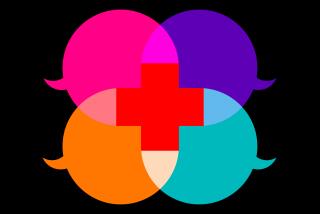Is a Facebook ‘like’ too much information?
- Share via
Go ahead, click the “like” icon on the “Wicked, the Musical” page on Facebook. You may be telling more people than you intended that you’re gay.
Click it for Hello Kitty. You may be telling someone you have an “open” personality but aren’t as conscientious as others.
That’s what researchers at the University of Cambridge are suggesting in their study of the content that people routinely endorse on Facebook, where about a quarter of regular users click the like icon. Their study is in the Proceedings of the National Academy of Sciences.
Researchers got more than 58,000 volunteers who use Facebook to take a psychological and intelligence test and share all their profile information and likes. Then they ran some complicated algorithms and checked how likes correlated with what they knew about users (from their profiles, pictures, the tests, etc.).
They also created an application that will do the same for your Facebook likes.
They found a very high correlation for many personal traits, and not just the stuff staring back at you in profile pictures, such as gender and ethnicity.
Take sexual orientation, about which some people are quite open, and others not so much.
Only 5% of participants “outed” by algorithms were connected with causes centeral to the lesbian, gay, bisexual and transgender community, such as “No H8 campaign,” which promotes “marriage, gender and human equality.”
So, it’s no surprise that liking “No H8 campaign” was pretty predictive.
It remains to be seen whether anyone is surprised that other endorsements correlated to being gay: liking American Idol star Adam Lambert , who is openly gay; Mac Cosmetics, whose products are aimed at professional make-up artists; “Wicked, the Musical”; and Kurt Hummel and Sue Sylvester,
Women liking “The L word” was a no-brainer for correctly identifying lesbians, whose sexual orientation also could be guessed correctly by “Tegan and Sara.”
If you had to look up “Tegan and Sara” to find out they are a Canadian indie band of openly gay identical twin sisters, you probably are straight.
You’re also probably straight if you are a man and liked the X Games, Wu-Tang Clan, Shaq and WWE professional wrestling. For women, liking “Lipton Brisk,” enjoying a little WWE with the dudes from the previous sentence, and liking “I Just Realized Immature Spells I’m Mature” were among the predictors for heterosexuality. (Marketers may want to take note: Liking Nike Basketball, Nike Women and Foot Locker were among the solid predictors on the heterosexual side of the scale.)
You may be extroverted if you like beer pong, Chris Tucker, “I Feel Better Tan” and cheerleading. You may be shy and reserved if you like RPGs (role playing games, not rocket-propelled grenades), Anime, manga, video games and Voltaire.
Not every trait has a high predictive value. Some lingered only a bit above chance, such as whether your parents split up before you were 21.
The correlations for drug use weren’t high, so to speak. But you might want to think before liking Austin, Texas, or “Pushing Your Friends into Random People in the Hallway.” If you want to clean up your act, you might want to like Pau Gasol, swimming, inside jokes, milkshakes and sour candy, in no particular order.
Oh, and you’re smarter than the average Facebook user if you like curly fries, for no reason known to the researchers. Spoiler alert: Curly fries are about to go viral.
David Stillwell, the research manager of Cambridge’s psychometrics center, readily acknowledged that one was “statistical noise.”
“Our very favorite like is for ‘many friends.’” Stillwell said. That’s because it let them slip the phrase “The Dollar You Are Holding Could’ve Been in a Stripper’s Butt Crack” into one of the premier scientific journals. (That Facebook page had more than 280,000 likes as of Monday night).
People with few friends tended to like Minecraft and Iron Maiden and “Walking With Your Friends and Randomly Pushing Them into Someone/Something.” (That last one also correlated with drug use.)
The authors of the study said their data should serve as renewed caution about what people share on social networks.
“All these likes are building up over time. Once you have hundreds of these, you can start making predictions,” Stillwell said. “If an employer saw it, what would they know about you?”
Experts in the human behavior field don’t have one take-away from the study, partly because it’s hard to have one take-away when it comes to human behavior. They note that there have been many studies that show you can tell a lot of things about someone from all manner of publicly available information.
Michael Walton Macy, a Cornell University sociologist who’s done similar modeling with other data, noted that some of those studies show grains of truth in the viral YouTube video from a few election cycles ago that lampooned followers of Howard Dean as a “latte-drinking, sushi-eating, volvo-driving, New York Times-reading, body-piercing, Hollywood-loving left-wing freak show.”
So go ahead, hit that like button.






